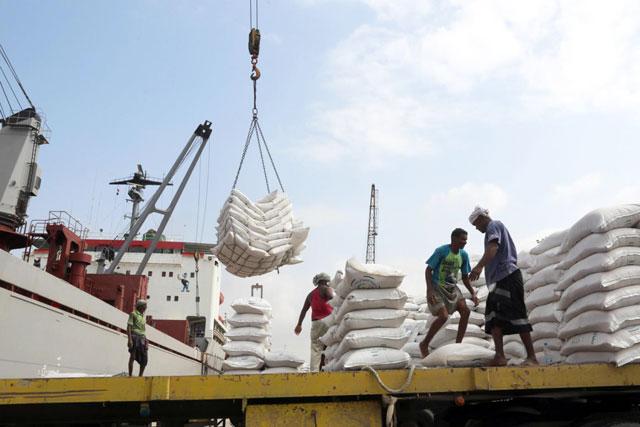You are here
A year after Yemen's Hodeida truce, hopes for peace dim
By AFP - Dec 15,2019 - Last updated at Dec 15,2019

Workers unload wheat assistance provided by Unicef from a cargo ship at the Red Sea port of Hodeida (AFP photo)
HODEIDA, Yemen — A year after Yemen's warring sides agreed to a UN-brokered truce for the key port city of Hodeida and its surroundings, peace remains out of reach.
Fighting between the government — backed by a Saudi-led military coalition — and Iran-backed Houthi rebels has subsided in western Hodeida province, but the slow implementation of the deal has quashed residents' hopes for an end to the conflict.
The landmark agreement signed in Sweden on December 13 was hailed as Yemen's best chance so far to end the fighting that has pushed the country to the brink of famine.
Hopes were high that a de-escalation in Hodeida, whose port serves as the country's lifeline, would allow desperately needed food and medical aid to reach millions in need.
But amid the conflict that has gripped the country since 2014, residents of the flashpoint city say they still live in fear.
"There are less clashes now, but they have not stopped completely," resident Rima Saleh told AFP.
"The agreement has yet to be implemented a year on and the relatively calm situation can explode at any moment," the 33-year-old said.
'Nothing new'
Last year, loyalists launched an offensive to retake the Red Sea port city, which serves as a crucial entry point for imports and humanitarian aid.
The offensive was halted when it reached the streets of Hodeida, before UN-brokered talks between the warring parties in Sweden yielded a ceasefire and a deal to release some 16,000 prisoners from both sides.
But "a year after the agreement, there is yet to be withdrawal from Hodeida, a long-lasting ceasefire [or] the release of all the prisoners," said Ali Al Sarari, advisor to the Yemeni prime minister.
In October, in what the UN hailed as a positive step, the two sides set up joint observation posts as part of de-escalation moves in the city, but they continued to trade accusations over violations of the Hodeida agreement.
The step came five months after the UN announced that the rebels had withdrawn from the city and two other nearby ports, the first practical step on the ground since the ceasefire deal.
But the government accused the militia of faking the pullout, saying it had merely handed control to its allies.
The coalition has so far freed only 135 Houthi rebels, and the insurgents have released 290 coalition fighters.
“Very, very few parts of the agreement have been implemented, including the erection of [joint] posts... but there is nothing else that is new in this regard,” said senior Houthi official Hamid Assem.
The most dangerous place
Aid groups say that the Hodeida region remains the most dangerous place in Yemen, despite the dip in violence.
“A quarter of all civilian casualties across Yemen in 2019 were recorded in Hodeida governorate,” said a joint statement on Thursday from 15 groups, including the Norwegian Refugee Council, Oxfam and the International Rescue Committee.
“Despite a ceasefire in the port city being at the heart of last year’s Stockholm Agreement, Hodeida has seen 799 civilian casualties since the agreement was signed, the highest toll countrywide,” they said.
Residents of Hodeida were killed or injured mainly by shelling, direct fire from small arms, light weapons and sniper fire, as well as explosive ordnance and landmines.
At least 3,086 civilian casualties have been reported countrywide since December last year, the statement added.
Since the Saudi-led intervention in March 2015, the conflict has left tens of thousands of people dead — most of them civilians — and driven millions more to the brink of famine, in what the UN calls the world’s worst humanitarian crisis.
The fighting has also left 24.1 million, more than two-thirds of the population, in need of aid.
Efforts to end the five-year war in Yemen appear to have gained momentum in recent months, with rebels largely halting attacks against Saudi Arabia, and Riyadh talking about an “open channel” of communication with the Houthis.
In an ominous sign though, the government and southern separatists have failed to meet a deadline to establish a power-sharing cabinet under a deal to end a crisis on another front — the fight for the southern city of Aden, which was snatched by the southern secessionists in August.
Hodeida resident Youssef Ali said he was not at all optimistic that there will be a solution to end the grinding conflict.
“The war will go on, despite agreements,” he said.
By Amal Mohammed and Dana Moukhallati
Related Articles
SANAA — The United Nations envoy for Yemen arrived in Sanaa on Monday for another round of talks aimed at finding a solution to fighting in
HODEIDA, Yemen — Yemen's government and Houthi rebels have set up joint observation posts as part of de-escalation moves in the flashpoint c
HODEIDA, Yemen — Saudi-led coalition air strikes reportedly killed eight Yemeni Houthi rebels near the port of Hodeida on Monday, triggering











